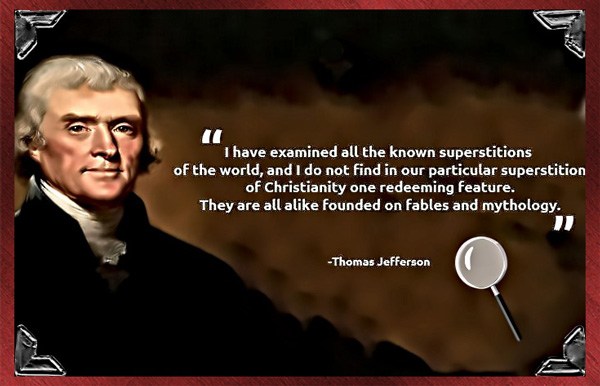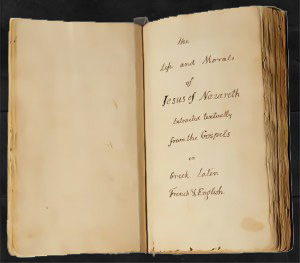
Thomas Jefferson and the Bible
"Fix reason firmly in her seat, and call to her tribunal every fact, every opinion. Question with boldness even the existence of a god; because, if there be one, he must more approve the homage of reason, than that of blindfolded fear." -Thomas Jefferson recommendation to his nephew Peter Carr in 1787.
Thomas Jefferson was a staunch supporter of religious liberty, but his quest to make sure church and state stayed separate in American politics earned him plenty of enemies.
During the presidential campaign of 1800, Jefferson's opponents, the Federalist, accused him of being an atheist and a libertine - a philanderer without morals or sense of responsibility (also means freethinker). Even with these accusations, Jefferson went on to win the election.
After the campaign of 1800, Jefferson was restrained about making any public statements on religion. However, he was to continue to comment on religion in letters to his trusted friends. Those comments are so large in volume and so varied that, for the last two centuries, Christians and secularists have argued whether Jefferson was a believer or not.
These private letters reveal that he was a deeply spiritual man who spent a considerable amount of time thinking about God.
Jefferson believed in the existence of a Supreme Being who was the creator and sustainer of the universe, but this was not the God of orthodox Christianity. He rejected the idea of the divinity of Christ, but was convinced that the fragmentary teachings of Jesus constituted the "outlines of a system of the most sublime morality which has ever fallen from the lips of man."
The year was 1804. The president sat at his desk in the White House on a winter evening. He took out two Bibles and opened them to the stories about Jesus. He grabbed a knife or razor, and began cutting up one Bible, then the other. When he was done, a collection of verses were pasted into a folio of blank pages. His compilations of ideas were literally extracts from the New Testament. Jefferson named this book "The Philosophy of Jesus of Nazareth."
That original copy has disappeared and is now lost to history.
The act of rewriting the bible would be considered blasphemous by some, inappropriate by others. Jefferson chose what he considered the worthy parts of the Bible. "The worthy parts of the Bible were easily distinguishable from the worthless-"as distinguishable," he later wrote in a letter to John Adams, "as diamonds in a dunghill."
Thomas Jefferson, letter to John Adams,
January 24, 1814
The whole history of these books [the Gospels] is so defective and doubtful that it seems vain to attempt minute enquiry into it: and such tricks have been played with their text, and with the texts of other books relating to them, that we have a right, from that cause, to entertain much doubt what parts of them are genuine. In the New Testament there is internal evidence that parts of it have proceeded from an extraordinary man; and that other parts are of the fabric of very inferior minds. It is as easy to separate those parts, as to pick out diamonds from dunghills.
Jefferson letter to Charles Thomson
Patriot leader in Philadelphia during the American Revolution and the secretary of the Continental Congress
1816 January 9. "I too have made a wee little book, from the same materials, which I call the Philosophy of Jesus. it is a paradigma of his doctrines, made by cutting the texts out of the book, and arranging them on the pages of a blank book, in a certain order of time or subject. a more beautiful or precious morsel of ethics I have never seen. it is a document in proof that I am a real Christian, that is to say, a disciple of the doctrines of Jesus, very different from the Platonists, who call me infidel, and themselves Christians and preachers of the gospel, while they draw all their characteristic dogmas from what it's Author never said nor saw. they have compounded from the heathen mysteries a system beyond the comprehension of man, of which the great reformer of the vicious ethics and deism of the Jews, were he to return on earth, would not recognise one feature. if I had time I would add to my little book the Greek, Latin and French texts, in columns side by side, and I wish I could subjoin a translation of Gassendi's Syntagma of the doctrines of Epicurus, which, notwithstanding the calumnies of the Stoics, and caricatures of Cicero, is the most rational system remaining of the philosophy of the ancients, as frugal of vicious indulgence, and fruitful of virtue as the hyperbolical extravagancies of his rival sects."

The Life and Morals of Jesus of Nazareth
Sixteen years later in 1820, at the age of seventy seven, retired from politics and living at Monticello, he created another. Jefferson purchased six Bibles. Two in English, two in French, and two containing both Latin and Greek, and cut them up, creating a second edited version of the New Testament, in four languages.
Within this book, he kept the words of Jesus and some of his deeds, but left out the miracles and any suggestion that Jesus is God. The virgin birth, gone. Jesus walking on water, gone. Multiplying the loaves and fishes, gone, along with Lazarus and his raising from the dead. Jefferson's version ends with Jesus' burial on Good Friday. There is no resurrection, no Easter Sunday.
Jefferson called this version "The Life and Morals of Jesus of Nazareth."
Jefferson's wall of separation
In Query XVII of Notes on the State of Virginia, Jefferson clearly outlined the views that led him to play a leading role in the campaign to separate church and state. In his fight for the separation of church and state, Jefferson befriended Baptist minister John Leland. As a Baptist in predominantly Anglican New England, Leland had often witnessed the persecution of his fellow clergymen. Like Jefferson, Leland was vehemently opposed to any state support of religion. This friendship culminated in the Virginia Statute for Religious Freedom:
"The rights of conscience we never submitted, we could not submit. We are answerable for them to our God. The legitimate powers of government extend to such acts only as are injurious to others. But it does me no injury for my neighbour to say there are twenty gods, or no god. It neither picks my pocket nor breaks my leg... Reason and free enquiry are the only effectual agents against error." -Monticello.org
Quotes
Christianity neither is, nor ever was a part of the common law.
-Thomas Jefferson, letter to Dr. Thomas Cooper,
February 10, 1814
Millions of innocent men, women and children, since the introduction of Christianity, have been burnt, tortured, fined and imprisoned; yet we have not advanced one inch towards uniformity.
-Thomas Jefferson, Notes on Virginia,
1782
In every country and in every age, the priest has been hostile to liberty. He is always in alliance with the despot, abetting his abuses in return for protection to his own.
-Thomas Jefferson, letter to Horatio G. Spafford,
March 17, 1814
History, I believe, furnishes no example of a priest-ridden people maintaining a free civil government. This marks the lowest grade of ignorance of which their civil as well as religious leaders will always avail themselves for their own purposes.
-Thomas Jefferson to Alexander von Humboldt,
Dec. 6, 1813.
If we did a good act merely from love of God and a belief that it is pleasing to Him, whence arises the morality of the Atheist...Their virtue, then, must have had some other foundation than the love of God.
-Thomas Jefferson, letter to Thomas Law,
June 13, 1814
My opinion is that there would never have been an infidel, if there had never been a priest. The artificial structures they have built on the purest of all moral systems, for the purpose of deriving from it pence and power, revolts those who think for themselves, and who read in that system only what is really there.
-Thomas Jefferson, letter to Mrs. Samuel H. Smith,
August, 6, 1816
Priests…dread the advance of science as witches do the approach of daylight and scowl on the fatal harbinger announcing the subversions of the duperies on which they live.
-Thomas Jefferson, Letter to Correa de Serra,
April 11, 1820
Man once surrendering his reason, has no remaining guard against absurdities the most monstrous, and like a ship without rudder, is the sport of every wind.
-Thomas Jefferson to James Smith,
1822
The religion-builders have so distorted and deformed the doctrines of Jesus, so muffled them in mysticisms, fancies and falsehoods, have caricatured them into forms so monstrous and inconcievable, as to shock reasonable thinkers, to revolt them against the whole, and drive them rashly to pronounce it's founder an imposter.
-Thomas Jefferson to Timothy Pickering,V
February 27, 1821
The truth is that the greatest enemies to the doctrines of Jesus are those calling themselves the expositors of them, who have perverted them for the structure of a system of fancy absolutely incomprehensible, and without any foundation in his genuine words. and the day will come when the mystical generation of Jesus, by the supreme being as his father in the womb of a virgin will be classed with the fable of the generation of Minerva in the brain of Jupiter.
- Thomas Jefferson to John Adams,
April
11, 1823
Ridicule is the only weapon which can be used against unintelligible propositions. Ideas must be distinct before reason can act upon them;
and no man ever had a distinct idea of the trinity. It is the
mere Abracadabra of the mountebanks calling themselves the
priests of Jesus.
- Thomas Jefferson, letter to Francis Adrian Van der Kemp,
30 July, 1816
![]()
All materials contained in this Website including but
not limited to the text and images, are protected by
copyright laws and may not be reproduced,
republished, modified, distributed, transmitted,
displayed, broadcast or otherwise exploited in any
manner without the express prior written permission
of the Editor. Any third party materials posted,
filed or otherwise communicated to this Website
become the copyrighted property of The Painful
Truth.
Copyright 2018 BY THE PAINFUL TRUTH | ALL RIGHTS
RESERVED
![]()
